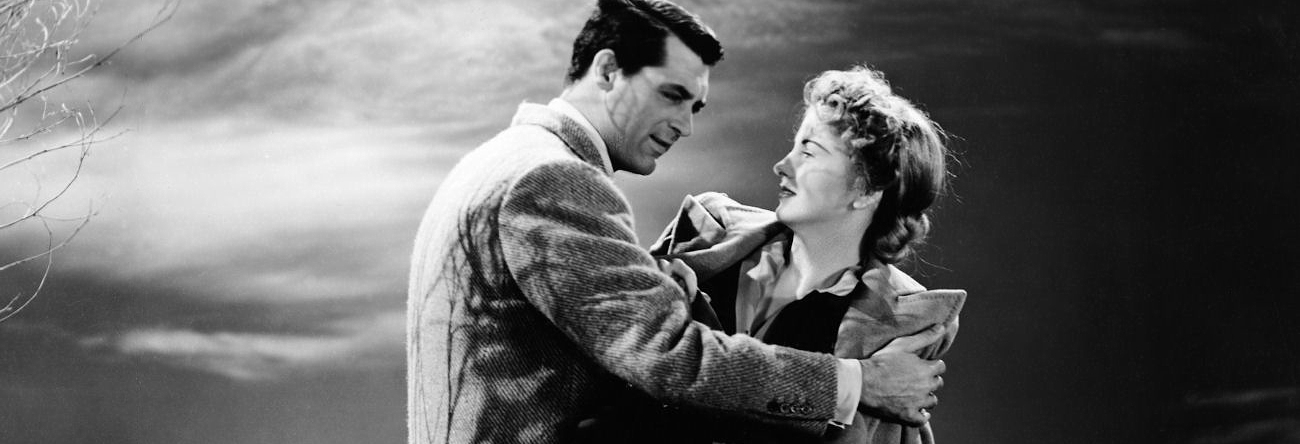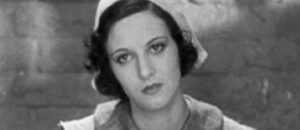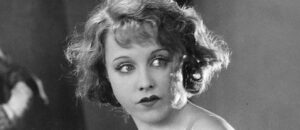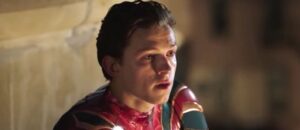In association with the National Film Preservation Foundation, High-Def Digest is proud to join the 2012 Hitchcock Blogathon. During the week of May 14th to 18th, we will blog about topics related to the films and career of the legendary Sir Alfred Hitchcock, with the goal of raising money to fund a new musical score and online streaming distribution for ‘The White Shadow’, an early silent film that young Mr. Hitchcock (then officially a writer and Assistant Director) used as a stepping stone to launch his own directorial career. These Hitchcock posts will run throughout the week, and will involve some special contributors to the blog. I’ll start things off with a look at the filmmaker’s 1941 thriller ‘Suspicion’, starring Cary Grant and Joan Fontaine.
After building a name for himself and a reputation as the “Master of Suspense” with his early films made in England, Alfred Hitchcock came to Hollywood in 1939 under contract to powerful producer David O. Selznick. Although this collaboration yielded the Best Picture Oscar-winning ‘Rebecca’ in 1940, Hitchcock didn’t care for working under the restrictive scrutiny of Selznick, and Selznick in turn didn’t appreciate the director’s stubborn insistence on making movies the way he saw fit. That same year, Selznick loaned out the prolific director to United Artists for ‘Foreign Correspondent’, which also received a Best Picture nomination, but it wasn’t until the following year that Hitchcock was finally able to produce one of his own films (though he went uncredited in that role). ‘Suspicion’ would be, at least arguably, the first truly “Hitchcockian” of Hitchcock’s Hollywood films, as well as his first collaboration with his favorite actor, Cary Grant.
Grant plays Johnnie Aysgarth, a layabout playboy who meets and quickly sets about seducing Lina McLaidlaw (‘Rebecca’ star Joan Fontaine), the spinsterish daughter of a wealthy retired general. While resistant at first, Lina soon finds herself succumbing to Johnnie’s charms. Their whirlwind courtship yields a perhaps-ill-considered quickie marriage, whereupon Lina discovers that Johnnie is not only frivolous with money, but has none of his own. After she catches him selling some of their wedding gifts to pay off gambling debts, Lina begins to suspect that Johnnie may have married her under false pretenses, and may even be planning to kill her to collect on an insurance policy. From that point forward, she reads ill intentions into his every action, and nearly drives herself mad with paranoia. But is Johnnie truly an evil schemer, or just a harmless fool? Seemingly every word he speaks could be read either way.
Despite being one of the earliest of his signature films, ‘Suspicion’ finds Hitchcock already in top form, gleefully delighting in the opportunity to set up and subvert his audience’s expectations. The first half of the movie has a breezy, comedic tone, while the second shifts into a much darker, very suspenseful frame, culminating in a justifiably celebrated scene involving one of the most famous glasses of milk in all of cinema.
While adapted from a novel by Anthony Berkeley, the film controversially rewrote the story’s ending to reverse the author’s original intention for the character. Hitchcock later complained that the studio forced him to make this change, but other reports claim that he was actively involved in the decision. Some fans consider this to be a regrettable failing of the picture, but frankly, I think the ultimately-chosen ending works just fine in its own context.
Joan Fontaine won the Best Actress Oscar for her performance in the film. Honestly, she’s a little mannered and unconvincing as the uptight prude in the first half, but does a much better job conveying her character’s mix of fear and doubt in the second.
‘Suspicion’ was last released on DVD by Warner Home Video back in 2004. The studio hasn’t seen fit to issue a Blu-ray edition yet. For the purposes of this article, I was able to stream a 1080p “HDX” version from VUDU, which was fairly satisfying except for one notable nuisance that may be more problematic for some viewers. The image has been encoded to use all 1920×1080 pixels, which means that the originally-4:3 picture will appear stretched to 16:9 by default, unless you can use your display’s aspect ratio controls to pillarbox it in the center of the screen. Unfortunately, many HDTVs lock out aspect ratio control over HD signals. If yours is one that does this, consider yourself warned.
However, if your display will allow you to manually adjust the aspect ratio, the picture is otherwise adequately sharp and detailed, aside from the stylistic affectation of the day to photograph all actresses in soft focus. Some minor dirt and damage is visible on the film elements, but the gray scale and contrast look good, and effectively showcase the movie’s expressive lighting. Film grain appears properly resolved. It adds texture without swamping the image. On the other hand, the Dolby Digital mono audio is a little harsh and shrill, especially in the music.
I would hope that an eventual Blu-ray release from the studio might offer improvement with better (lossless) audio and a properly pillarboxed image. Until then, this VUDU streaming version is satisfying enough for rental purposes.
—
To contribute to the ‘White Shadow’ restoration project, please visit the NFPF’s donations page. For additional information, also see the NFPF web site page or the Self-Styled Siren, Ferdy on Films and This Island Rod blogs.







Marilyn Ferdinand
It is really interesting to hear the background for Suspicion, which you survey economically and well. I do hope we can get a Blu-ray soon. After reading Michael Smith’s post on introducing students to black-and-white through Blu-ray discs, this would be a great addition to the Blu-ray film library.
Grand Old Movies
This has always been one of my favorite Hitchcock’s – its low-key style which belies its growing shades of paranoia have a way of staying in your mind. I always found Cary Grant’s Lothario a little creepy right from the beginning, even though, as you note, the 1st half is played for humor. His simultaneously offhand yet aggressive courting of Fontaine has an unpleasant flavor of emotional manipulation. One of my favorite parts is the dinner scene, where the participants discuss ways of murdering someone without being found out -I can just imagine such a dinnertime conversation taking place at the Hitchcocks’ table!
EM
I should watch this again soon. It’s been many years. I’m ready; the recent Blu release of Rebecca has had me thinking about this period in Hitch’s career.
Tinky
I agree that the ending as it is works best. It would be a little too pat if he WERE trying to kill her. On the other hand, she is pretty darn annoying so it would be understandable!
Joe Thompson
Josh: I sometimes forget whether I am watching Rebecca or Suspicion. Thanks for sharing your thoughts.